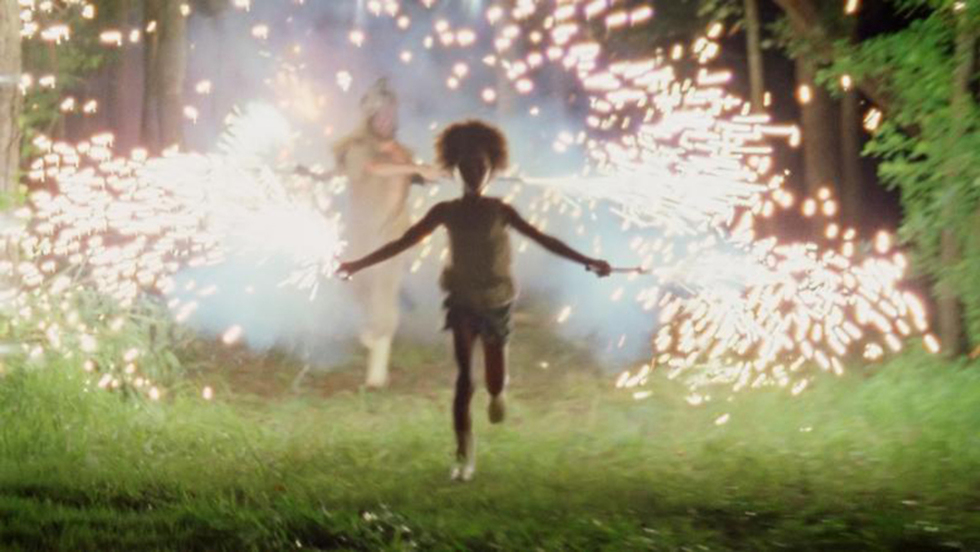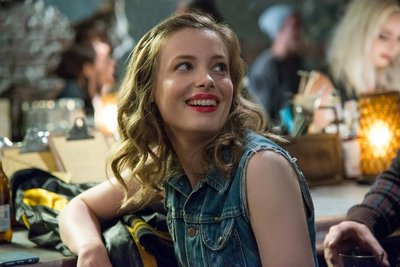
BY KRISTIN MCCRACKEN |
Q&A with Beasts of the Southern Wild Screenwriter Lucy Alibar: "Grits Were Raining Down from the Sky"
At the center of Benh Zeitlin's new film is Hushpuppy: an indelible girl-spirit forging her way through hurricanes, impending death, and a glacial shift in her understanding of the world around her. It's magical stuff, indeed.

Ever since Beasts of the Southern Wild won the Grand Jury Prize at this year’s Sundance Film Festival, mythical praise for the film’s magical spirit have been circulating among the film community—exhortations mostly along the lines of “Beasts will restore your faith in filmmaking.” Director Benh Zeitlin’s debut feature film might have been overhyped, yes, but the narrative featuring (in the simplest of terms) a six-year-old’s view of Hurricane Katrina and its aftermath is indeed regenerative—Beasts of the Southern Wild is a tale of faith, hope, family, and resurrection.
At the heart of the story is an indomitable little girl named Hushpuppy, who lives with her father in a (fictional) part of the Bayou called The Bathtub. Their community’s abject poverty—barely a roof in sight, let alone a cellphone or laptop—at first renders the time period almost unidentifiable, or at least irrelevant. However, a storm is coming, and the inhabitants face the onslaught with a collectively stubborn spirit of camaraderie that we know all too well from 24-hour news reports—Katrina is soon upon them.

Throughout the film, the motherless Hushpuppy, played by the revelatory (sorry, but that’s the only word to use) newcomer Quvenzhané Wallis, deals not only with Mother Nature, but also with the increasing sickness of her father Wink (another first-time actor, Dwight Henry), and with prehistoric beasts called Aurochs, which seem to have sprung to life in her active imagination from a tattoo on her nurturing schoolteacher’s thigh. (Stick with me.) As Hushpuppy rages, rebels, and eventually accepts what comes her way, the calm at her core is much like the eye of a storm—the world of the film revolves around her, and she survives intact, wearied but wiser for her experience.
Where did Hushpuppy come from? Beasts of the Southern Wild was adapted by director Benh Zeitlin and playwright Lucy Alibar from her play entitled “Juicy and Delicious.” (Alibar and Zeitlin met as tweens when the two of them won a playwriting contest.) I sat down with Alibar to talk about how Hushpuppy evolved from stage to screen.

Tribeca: I just saw the movie last night and I’m still processing. It’s so rich and so wonderful. What was your initial impetus for writing the play?
Lucy Alibar: I wrote the play right when my dad was starting to get sick. Usually I’m a pretty in control person and pretty poised, but for some reason I couldn’t really process it; it really threw me for a loop. So I started writing a play about this kid named Hushpuppy losing his dad, and his world starts to fall apart in terms of time and order and space. Grits start raining down from the sky and the Aurochs start coming out of these caves through the red clay of Georgia to devour schoolchildren, and the teacher and the father are trying to prepare the children for the end of the world when there aren’t any grown-ups left and they’re not children anymore.
Looking back on it, I think I was writing about me not being a child anymore—figuring out how I’m actually going to live through that. Because you can’t be a child if there aren’t any grown-ups, and I felt like my grown-ups were falling away. So that was the start. Benh liked the story, and he liked the Aurochs, and he liked the characters.
He wanted to do his first feature with these characters and storylines, [but set] it in south Louisiana where the ground is actually sinking. He was shooting [his short film] Glory at Sea at that time—that was how he came to New Orleans—and we drove down to the end of a road in Louisiana and found a spot, which is where we put The Bathtub. He really wanted to make a movie on that land, where it’s actually sinking.
Tribeca: This was your first screenplay. How did the two of you construct the screenplay, and how much was improvised?
Lucy Alibar: It went through many drafts. We went through all the Sundance labs, came away and re-wrote. We both took passes at it: he would really want to get the Bayou right, and I would really have to get this relationship right, so we’d trade it back and forth. And then when we met Quvenzhané [Wallis]—Hushpuppy was originally written for a 9- to 11-year old, and she’s 6—a lot of re-writing had to be done around that. For the best, I think; she’s so expressive…

Tribeca: She’s a superstar. She’s in every scene of the movie. So the lines that you filmed were on the page?
Lucy Alibar: During the rehearsals we improvised, but they were on the script by the time that they said them.
Tribeca: You’re from a different part of the South. What are the differences and similarities between the communities where you grew up and south Louisiana?
Lucy Alibar: I grew up in North Florida. Well, there is this incredible sense of family—in both places, your community is your family. There’s this incredible generosity—especially with food—and there’s this very personal spirituality. Even if it’s not religion, everybody has a close relationship with the bigger universe in a way that’s very personal to them; I don’t find that [in New York] as much. I’m really from the Bible Belt, and going to church is something everyone does. In the Bayou, I found the sense of spirituality to be just as much—if not more—but it’s not based on church going.
Tribeca: Does it have to do with nature?
Lucy Alibar: Yeah. I mean people will talk about God, but it’s a little more fluid. People’s relationships with what they think of as “God” is so interesting to me, because of where I’m from and then moving up here, where you’re not supposed to talk about it. And to me that’s what Hushpuppy is going through. The whole movie is figuring that out, how people see themselves in relation to the order of things.

Tribeca: Tell us about the Aurochs. Where did they come from within you, and how did you know that they were the magical element the story needed?
Lucy Alibar: I wanted the play to look like what losing a parent feels like. To me, that looks like this very almost awkward chaos, where everything is normal but then there’s a lemon just flying through the air. And everybody sees it, but you don’t know what to make of it.
As for the Aurochs coming out of the red clay to eat the schoolchildren… I really like people having their own interpretations of it, because I feel like everybody gets it in some way. But I think the Aurochs came out of this place of danger—this very new world and the destruction of everything you’ve known.
Tribeca: It’s like a glacial shift, literally and figuratively; they are so full of meaning. What do you want audiences to take away from the film once they’ve processed it?
Lucy Alibar: I really love that we’re all getting to watch a little girl be a hero, so there’s that aspect of it. But I wrote it from an extremely personal place, and I know Benh was coming from somewhere really personal too. Mostly I just want people to engage with it as intimately as they can—laugh when they want to, and just be with it and have their own relationship with it.
Tribeca: What has this whole journey been like, from Sundance to Cannes to now?
Lucy Alibar: It’s just been so moving to have people come up to me after [they see the movie]; typically, they’ll talk to me about their relationship with their dads, which is different for everyone. It’s organic and natural, and I love hearing people’s stories about their fathers. That’s been incredibly intimate and beautiful, and completely unexpected. I love it.

Beasts of the Southern Wild opens today in select cities. Find tickets.
Like Beasts of the Southern Wild on Facebook.
Watch the trailer:
Watch Glory at Sea, Benh Zeitlin’s award-winning short film:

